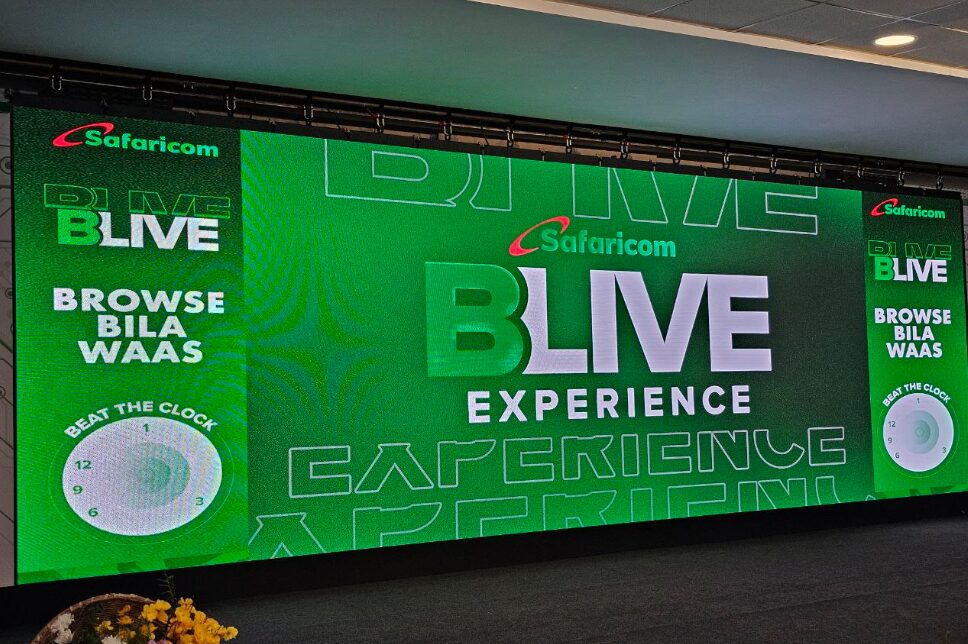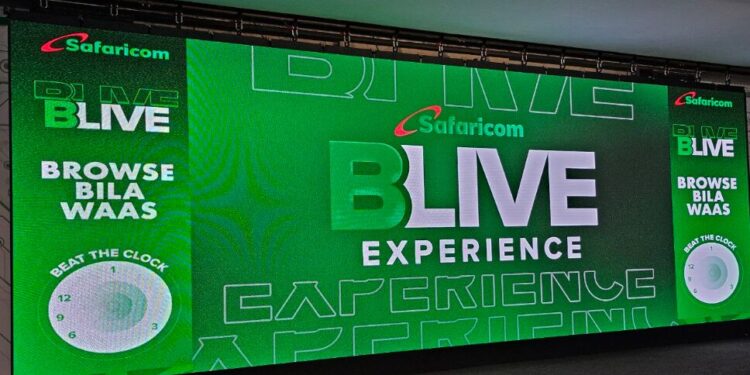A move to introduce Kenya’s first large-scale pay-by-time mobile internet product has placed new dynamics at the centre of the country’s data market, with customers now able to purchase access based on duration rather than volume.

Safaricom unveiled the service, branded B-Live, on Wednesday at the Michael Joseph Centre in Nairobi, positioning it as a fresh option alongside its conventional megabyte and gigabyte bundles.
The product, described as an industry first in Kenya, is intended to broaden consumer choice and address longstanding frustrations over traditional bundles.
Through the new model, customers can purchase one hour of browsing for Ksh 20, three hours for Ksh 50, or six hours for Ksh 150.
The company said this will give subscribers greater flexibility and transparency over their internet usage, enabling them to structure their connection around time rather than data volume.
The offering is expected to resonate with diverse segments of the market, from students attending virtual classes to creators uploading multimedia content and professionals relying on mobile connectivity while on the move.
At the launch event, Fawzia Ali-Kimanthi, Safaricom’s Chief Consumer Business Officer, explained that the initiative is rooted in a recognition of the varying habits of Kenyan consumers.
“We recognise that our customers are different. Some prefer managing their usage in MBs or GBs, while others simply want to enjoy the internet for a set period of time. By adding this option, we’re putting control back in the hands of our customers and enabling them to focus on what matters most. Whether that’s learning, creating, connecting, or hustling,” she said.
The company said B-Live builds on its commitment to enabling Kenya’s digital lifestyle, with a view to creating options that meet the needs of youth, entrepreneurs, professionals, and content creators alike.
Safaricom executives added that the product is meant to “give more choices to customers” and to complement the traditional bundle structure that has long been the foundation of the data market.
During the launch, Ali-Kimanthi also clarified that B-Live is not unlimited in the strictest sense.
“The data bundle is not limited, as that would cause congestion and other users would find it hard to use the internet,” she said.
Safaricom confirmed that hotspotting will not be supported on B-Live bundles, and that a fair usage policy will apply, meaning heavy users could see speeds reduced if they exceed undisclosed thresholds.
These provisions mirror network management approaches that Safaricom has already applied to its fibre-to-the-home and 5G services.
By anchoring the product in time-based usage, Safaricom has introduced a system that recalls the early era of internet billing, where consumers paid for connection time rather than for data volume.
The difference today is that the service runs on modern fourth and fifth generation networks, giving subscribers the ability to consume large volumes of content within the time blocks they purchase.
For heavy users such as video streamers, gamers, or large file downloaders, the model could represent substantial savings, while light users may still find traditional volume bundles more economical.
No other operator in Kenya currently offers time-based bundles at this scale. Airtel, Telkom, and Faiba continue to rely on volume-based models, often at lower per-gigabyte rates than Safaricom.
Airtel has experimented with hourly bundles, but these are capped by data limits, while Faiba’s product catalogue contains no uncapped, time-bound packages.
Safaricom’s ability to take this step rests on the breadth of its network, which covers about 96 percent of Kenya with 4G and has extended 5G coverage beyond major towns into semi-rural areas.
Analysts argue that this network depth is critical to the viability of B-Live, since time-based billing transfers the risk of poor connection directly to the user: every minute of low speed or dropped signal erodes the value of the purchased bundle.
This dynamic places pressure on the operator to maintain stable connections, but also reinforces its infrastructure advantage over rivals that have narrower coverage footprints.
Safaricom has invested heavily in spectrum acquisition at 700 MHz and 900 MHz, in densifying 4G sites, and in preparing 5G through technologies such as network slicing.
These efforts underpin its ability to sustain time-based internet sessions without compromising service quality.
By linking B-Live to these investments, the company aims to strengthen customer trust and to reduce complaints that data disappears too quickly, a recurring frustration in Kenya’s mobile market.
The launch event attracted content creators, entrepreneurs, and public personalities, reinforcing Safaricom’s effort to market B-Live as a product that speaks directly to Kenya’s digital generation.
Attendees ranged from musicians such as Iyanii to television hosts such as Azeezah Hashim, alongside social media influencers and radio personalities.
Their presence was used to demonstrate how different segments of society might integrate B-Live into their daily routines, from streaming and creative production to social engagement and remote work.
Safaricom said the service is accessible through its *544# and *555# menus, offering immediate purchase of hourly bundles.
The product is expected to serve as both a supplement and a test case for how Kenyan consumers respond to a shift in the unit of measurement for mobile data.
While adoption levels remain to be seen, the innovation has introduced a fresh dynamic into the market and may compel competitors to re-examine their own data pricing models.
For now, B-Live represents both a strategic bet and a potential inflection point in Kenya’s telecoms landscape.
By moving from volume to time, Safaricom is seeking not only to diversify its portfolio but also to address persistent perceptions of unpredictability in bundle consumption.
Whether the product succeeds will depend on execution and customer experience, but its introduction has already marked Safaricom as the first operator in East Africa to mainstream hourly internet access.
Kenyan Business Feed is the top Kenyan Business Blog. We share news from Kenya and across the region. To contact us with any alert, please email us to [email protected]











